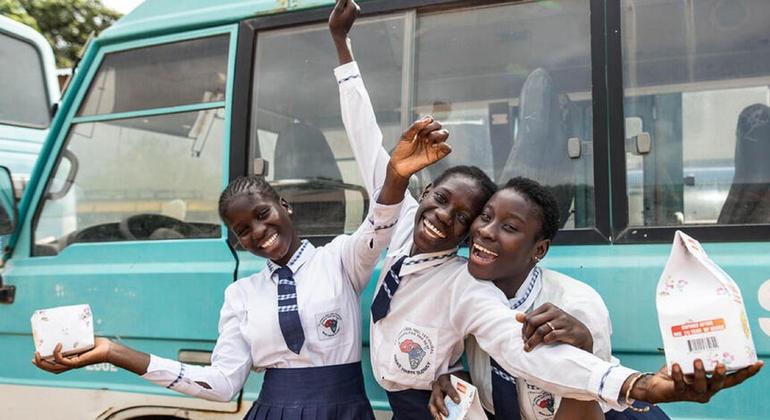Period poverty, or the inability to afford menstrual products, is a serious issue especially in developing countries, an issue menstruating girls and women grapple with monthly and a spotlight topic on Menstrual Hygiene Day, observed annually on 28 May.
“I’m happy to come work here because I meet and work with other people,” said Ms. Fatty, who operates a special machine to install snaps on each pad. “This place gives me joy because I can forget about my disability while working here.”
The sturdy, long-lasting pads she produces help women like her with a mobility impairment, who have trouble going to the restroom. After working there for a year, Ms. Fatty hopes to continue. While her disabilities bring many challenges and she struggled to make ends meet for a long time, her life has become better since she joined the project.
Keeping girls in school
In The Gambia, Africa’s smallest nation, period poverty is prevalent across the country, but it hits harder in rural areas, according to the UN Population Fund (UNFPA). Some girls skip school for around five days every month due to the lack of menstrual products and sanitary facilities.
The girls are afraid of staining their clothes and become a target of bullying or abuse, the agency said. As a result, gender inequality widens; boys will have an advantage as they attend school more often than girls, who have a higher chance of dropping out of education.
To tackle this problem, UNFPA developed a project in Basse, in the country’s Upper River Region, to produce recyclable sanitary pads. These pads are distributed at schools and hospitals in local communities.
The agency takes it as an opportunity to talk about bodily autonomy and sexual and reproductive health with young girls to mitigate period shaming and stigma.
Empowering young women
The project is also a way of empowering young women in the community as it provides them with a secure job and an opportunity to learn new skills.

SDG Goal 6: Clean Water and Sanitation
Since 2014, Menstrual Hygiene Day has been observed on the 28th day of the fifth month of the year as menstrual cycles average 28 days in length and people menstruate an average of five days each month.
Poor menstrual health and hygiene undercuts fundamental rights – including the right to work and go to school – for women, girls and people who menstruate, according to UNFPA.
It also worsens social and economic inequalities, the agency said. In addition, insufficient resources to manage menstruation, as well as patterns of exclusion and shame, undermine human dignity. Gender inequality, extreme poverty, humanitarian crises and harmful traditions can amplify deprivation and stigma.
With that in mind, the theme for Menstrual Hygiene Day this year is “Making menstruation a normal fact of life by 2030”, said UNFPA Executive-Director Natalia Kanem.
“A girl’s first period should be a happy fact of life, a sign of coming of age with dignity,” she said. “She should have access to everything necessary to understand and care for her body and attend school without stigma or shame.”
The Day brings together governments, non-profits, the private sector, and individuals to promote good menstrual health and hygiene for everyone in the world. The occasion also aims at breaking the silence, raise awareness around menstrual issues and engaging decision-makers to take actions for better menstrual health and hygiene.
Learn more about what UNFPA is doing to eliminate period poverty here.
Eliminating period poverty
UNFPA has four broad approaches to promoting and improving menstrual health around the world:
- Supplies and safe bathrooms: In 2017, 484,000 dignity kits, containing pads, soap and underwear, were distributed in 18 countries affected by humanitarian emergencies. UNFPA also helps to improve the safety in displacement camps, distributing flashlights and installing solar lights in bathing areas. Promoting menstrual health information and skills-building, projects include teaching girls to make reusable menstrual pads or raising awareness about menstrual cups.
- Improving education and information: Through its youth programmes and comprehensive sexuality education efforts, UNFPA helps both boys and girls understand that menstruation is healthy and normal.
- Supporting national health systems: Efforts include promoting menstrual health and provide treatment to girls and women suffering from menstrual disorders. The agency also procures reproductive health commodities that can be useful for treating menstruation-related disorders.
- Gathering data and evidence about menstrual health and its connection to global development: A long overlooked topic of research, UNFPA-supported surveys provide critical insight into girls’ and women’s knowledge about their menstrual cycles, health, and access to sanitation facilities.



